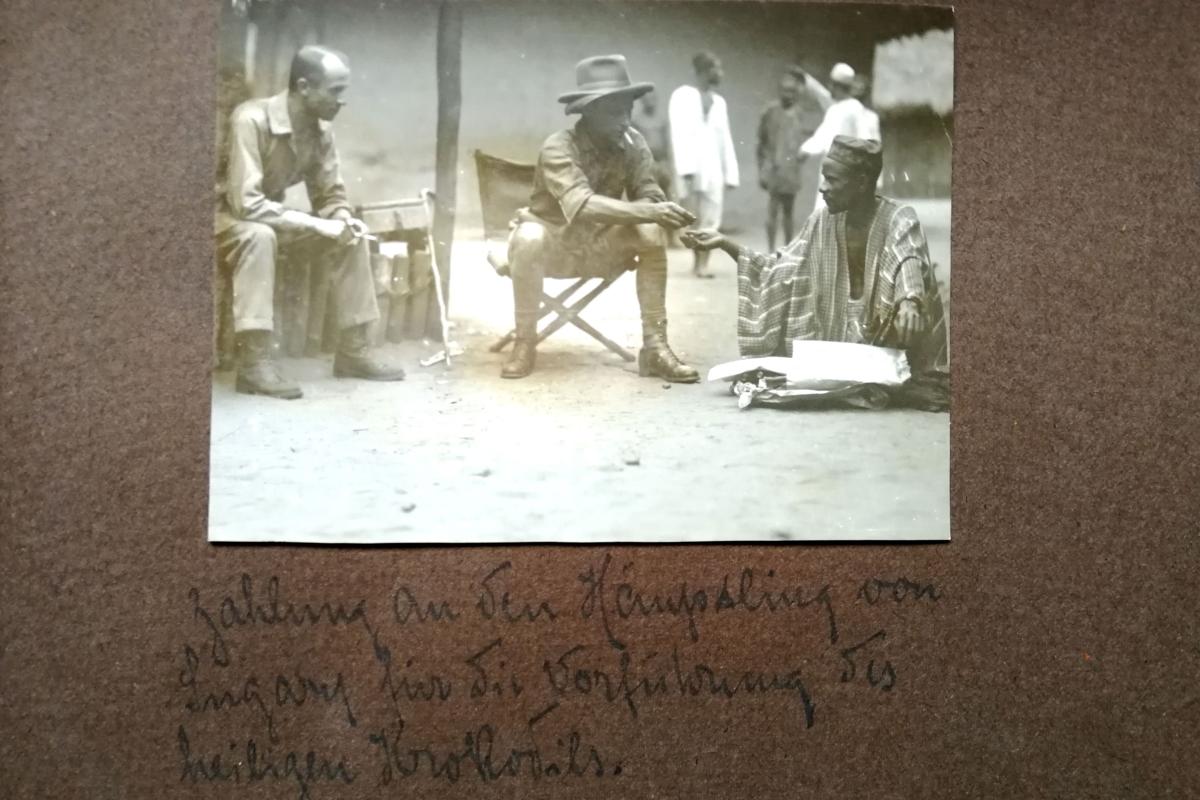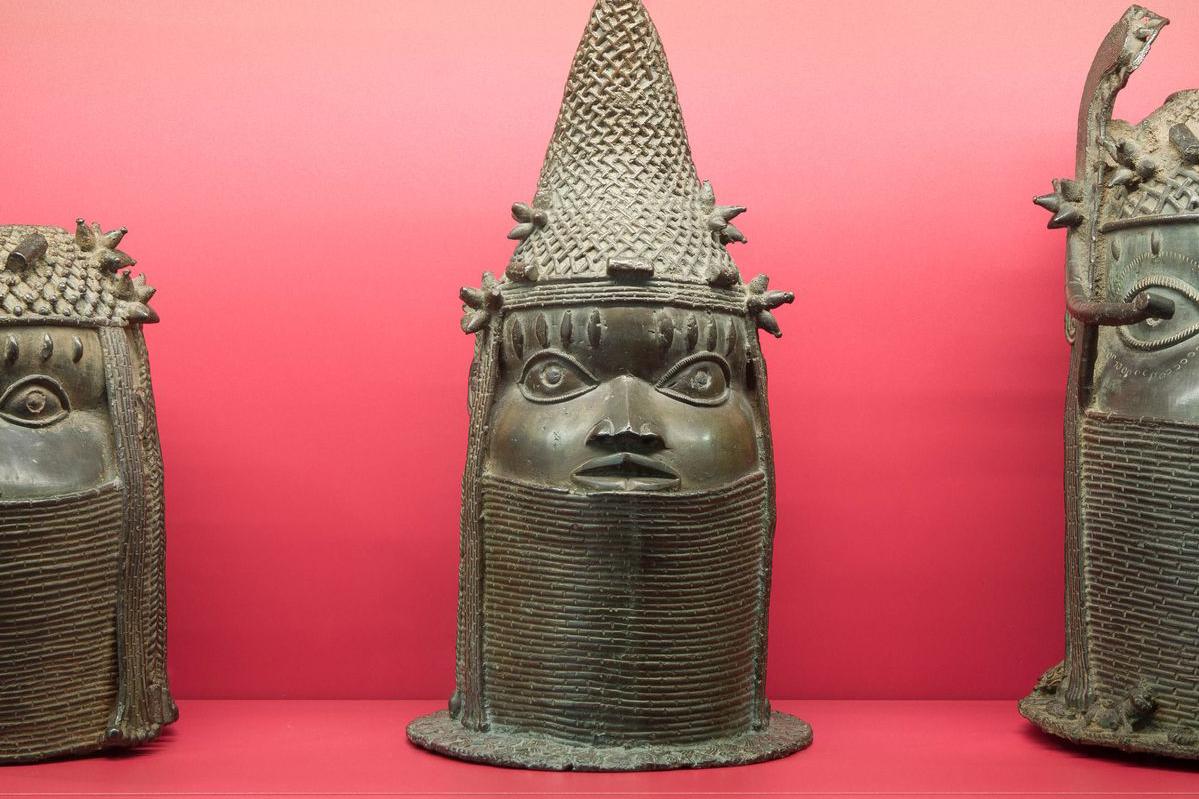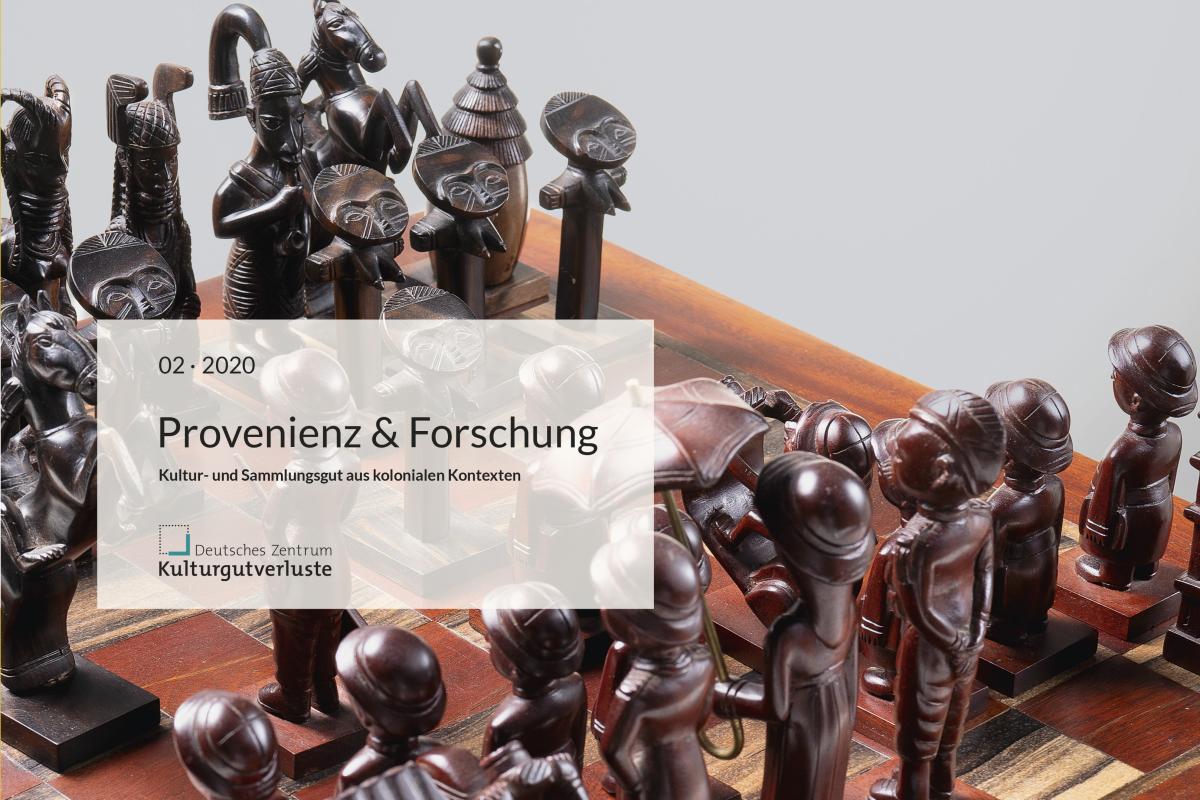Project Funding for Cultural Goods and Collections from Colonial Contexts
General Information
In January 2019, following a decision by the Foundation Board, the German Lost Art Foundation set out the conditions for the funding of provenance research projects on cultural goods and collections from colonial contexts and for basic and contextual research relating to this field. The corresponding Guideline for the funding of provenance research projects on “Cultural Goods and Collections from Colonial Contexts” came into force on January 1, 2019, and a revised version has been available since January 2, 2024. In early February 2019, the Funding Committee "Colonial Contexts" was established to evaluate research proposals.
In its understanding of the term “colonial contexts” the department follows the “Guidelines for German Museums. Care of Collections from Colonial Contexts”. The funding guideline focusses on cultural goods and collections that were taken to Europe in the course of colonial expansion. Cultural goods and collections from colonial contexts are found in various types of museums and collections, not just in ethnological museums. Appropriate handling of such artifacts requires interdisciplinary and international cooperation and, in particular, unbiased collaboration with experts, interest groups and institutions, as well as with potential claimants from the countries and communities of origin.
On March 13, 2019, the Standing Conference of the Ministers of Education and Cultural Affairs of the Länder together with representatives of the German government and leading municipal organizations agreed on the Framework Principles for Dealing with Collections from Colonial Contexts. The “Framework Principles” cover important questions such as transparency, provenance research and the return of cultural goods and collections.
Like the “Framework Principles”, the Foundation’s activities are thus oriented to the following funding objectives:
- systematically and sustainably reviewing the provenance of cultural goods from colonial contexts in public museums and collections, including libraries and archives, in Germany;
- researching and addressing fundamental general questions regarding cultural goods from colonial contexts in public museums and collections, including libraries and archives, in Germany (basic research);
- documenting the research results, particularly in order to make them publicly accessible in digital form.
In addition, the following aims shall be promoted and reinforced:
- raise and increase awareness of the importance of provenance research relating to cultural goods from colonial contexts, especially in institutions that have no or very little experience in this subject;
- support the development of specific documentation and publication standards for cultural goods from colonial contexts;
- promote the transfer of knowledge between the institutions that collect goods and support the development and strengthening of national and international research networks that include the countries and communities of origin;
- encourage the sharing of findings and experiences from the projects as part of education and training activities.
Applications may be submitted by publicly funded institutions based in Germany that collect or hold cultural goods from colonial contexts and institutions that carry out research in this field. These include museums, libraries, archives, and university collections. Since January 1, 2021, private legal entities based in Germany that collect, hold, or research cultural goods from colonial contexts and which are recognized as serving public-benefit purposes under Section 59 in conjunction with Section 52 of the German Fiscal Code are also eligible to submit proposals for provenance research. We welcome joint applications from more than one institution, such as a museum and a university, or several museums, especially if they concern collection holdings or contexts that are closely linked historically.
Applicants should, wherever possible, work closely with partners from the countries of origin of the collections—ideally right from the conceptualization stage of the project and when compiling the research application. Since January 1, 2021, it is therefore possible to submit essential portions of the research proposal in English. Please be sure to coordinate submissions of proposals in English with the department in advance. For designing the cooperation, a cooperation agreement can be useful. Parts of the funds provided by the Foundation may also be used in the countries of origin of the collections.
Our funding is intended to enable provenance research. The awarded grant can be used for creating fixed-term staff posts, contract work, and also for travel costs and material expenses.
Forms of Project Funding
Long-term research need
Funding is provided to meet a shortfall in financing. It is therefore only possible to apply for supplementary funding towards the project costs, i.e. the applicant must make their own financial contribution to the project costs. The amount the applicant contributes must take into account the applicant’s size, funding body and financial resources. An application can be submitted for a period of up to 24 months with the option to extend the project. The total duration should not exceed 36 months. In exceptional cases, a project duration of up to 60 months is possible. However, it may also make sense to propose a project with a shorter term initially (e.g. 12 months) and then submit an extension request for a longer duration later on. This could be the case, for example, if you are planning to do basic preliminary work first as part of the project, such as determining the regional origin of objects, and then establish the relevant international cooperative partnerships in a second stage. Applications for new long-term projects can be submitted this year on October 1, 2024 and then in subsequent years on April 1 and October 1.
Short-term research need
With regard to the funding of short-term projects, Section VI (3) of the Foundation’s funding guideline makes explicit reference to the particular urgency of the project and of individual research cases. Particular urgency is deemed to exist if, for example, a request for information or for a return has been made by a third party. Short-term research need can also exist in the case of an Initial Check (see Section IV (1) 1). Such projects are established for the purpose of an initial, cursory examination of suspicious circumstances in institutions that collect or hold cultural goods, but which themselves do not have the necessary staff capacity for this examination. In both cases, an application for full financing can be submitted, i.e. the applicant usually does not have to make their own financial contribution. €40,000 is the maximum funding amount that can be applied for. The application can be submitted for a period of up to six months; an extension is not possible. A proposal that meets a short-term research need can be submitted at any time; it is not tied to the application deadlines for long-term projects.
The team at the Department for Cultural Goods and Collections from Colonial Contexts is available to answer any questions and offer advice about designing and preparing projects and submitting applications.
Important documents
Procedure
Preparing your application and getting advice
Applications for new long-term projects can be submitted this year on October 1, 2024 and then in subsequent years on April 1 and October 1. Proposals for short-term projects can be submitted any time.
Step 1
First, you should decide which of the available funding formats described below is suitable for your proposal.
Alternative A: Provenance research
Prepare an initial overview of the possible colonial contexts relating to the objects in your collection or the collection you want to examine. The recommendations for prioritization from the Foundation’s funding guideline, Section IV (2) “Object of Funding”, may help you here. They are based on the “Guidelines for German Museums. Care of Collections from Colonial Contexts” (2019).
Select a collection or a group of objects that can be dealt with feasibly in the planned project period. Please note that a systematic overall review of all holdings can only be funded for small establishments with a limited number of objects.
Familiarize yourself with the subject matter so that you are able to contextualize your project (at least to some extent) within a wider history of scholarly engagement and the history of the collection. State the needs and requirements as clearly as possible.
Alternative B: Basic and contextual research
This relates to projects in which the main question is of fundamental importance for provenance research on colonial contexts, beyond individual objects and groups of objects. For example, this includes the reconstruction and analysis of stakeholder networks, structures, processes and events that were crucial for the appropriation of objects and their transfer to German collections (e.g. trading networks and “research expeditions”). Consider whether, in fact, your project has this overarching importance. This is the case if, for example, your research findings are relevant for a large group of institutions that hold collections, researchers that work on issues of provenance, and/or for interest groups from the countries of origin.
At this early stage it is advisable to have an initial consultation with the Foundation in order to ensure the proposed project complies with the funding guideline in terms of its scope and objectives.
Alternative C: Indexing and analysis of archival records and documents
If you own archival records and documents that are of fundamental significance beyond the individual case, you might be able to apply to us for the funding of a project for their indexing and analysis in exceptional cases.
In this case, please first describe and analyse the holdings and, in particular, explain for whom outside your institution these holdings are relevant and for what reasons, and why this results in a special significance of your holdings. Here, it will not be enough to simply refer to the need for basic transparency for research purposes. You can add weight to this point by for example obtaining letters of support from relevant institutions or scholars and attaching them to your application.
Digitization of the documents themselves is only possible if doing so is not feasible within the scope of the applicant’s duties and must therefore be justified separately. Here, too, the special significance of the holdings must be demonstrated.
If your projects aims at the creation of your own digital infrastructure (e.g. a database), your application must include a concept for the permanent maintenance and care of this infrastructure as well as a more detailed explanation of why none of the existing infrastructures is suitable for the incorporation of your data holdings. In principle, all data generated must be available in common exchange formats. Digitization should be guided by the "Rules of Practice for Digitization" of the German Research Foundation (DFG).
All indexes, overviews, and finding aids developed in your project must be bilingual (German/English). Therefore, you should already include a corresponding translation in your project. This does not apply to individual archival records or documents, but to all summarizing and superordinate references. The same applies to the exceptional creation of a database: entry page, explanations and field names must also be bilingual.
The goal of your project should be to make the respective holdings as widely accessible as possible to all interested parties; paid access solutions or provision only within the respective institution are therefore generally ruled out. In the case of particularly sensitive holdings, exceptions can be made to this general access. In this case, please give detailed reasons for the planned restrictions and present an appropriate access concept (e.g. access only upon request/after appropriate instruction/for specific persons).
Alternative D: Short-term projects with special urgency/individual research cases
These projects deal with provenance research on individual objects or small groups of objects that is of particular urgency. This can be the case, for example, if there is a restitution demand or at least a request for restitution. In projects involving human remains and culturally sensitive objects (see also Section IV (2), first two points), special urgency is also regularly assumed.
Alternative E: Short-term project “Initial Check”
The so-called “Erstcheck” (initial check) is designed to allow an initial cursory inspection of a collection in institutions which collect or hold cultural property but do not have the staff to undertake such research. At least some indications of a connection to colonial contexts should be present, though concrete or more detailed information does not need to be available. Funding for a first inspection can be applied for with regard to any type of object. A possible result of a first inspection is the identification of individual or grouped objects which require more extensive provenance research. For this purpose, a short or long term application can be put forward in consultation with the department once the project is complete.
Step 2
Consider whether there are any potential cooperation partners for your project and get in contact with them. These could be collecting institutions with similar collections and/or topics or priorities; universities with related research projects and interests; as well as experts, interest groups and collecting/research institutions in or from the countries and communities of origin. Cooperation with partners from the countries and communities of origin, especially with potential claimants or descendants, is particularly encouraged.
Step 3
Together with the cooperation partners, work out a research concept and strategy, task distribution and specific project goals. Set out how the requested funds are going to be split between the cooperation partners. Where possible, obtain informal declarations of intent from the cooperation partners as confirmation of the planned cooperative partnership. In particular, if you intend to (jointly) examine another institution’s collection, the proposal must be accompanied by a declaration of intent from the party with authority to possess the collection objects that will be investigated. For establishing and organizing collaborations between universities and museums/collections, we recommend using our Checklist Cooperations as a guide. Identify the sources and archive holdings that need to be looked at for the project and include any necessary research trips in your proposal.
Step 4
Set out your motives for submitting a proposal. Explain the colonial contexts that will be addressed by the project, in particular, violent acquisition contexts or contexts that would not be justifiable on legal or ethical grounds today. Present any preliminary work that has already been carried out. Develop a concept for publishing the project findings and for achieving the required transparency for an international public audience. Usually this includes providing information in different languages. Remember to include the relevant costs for translation.
Step 5
Create a work plan that is as detailed as possible, including individual work steps and project goals.
Step 6
Draw up a financing plan and differentiate between your own funds, the funding requested from the Foundation and other third-party funding.
Services provided by in-house staff—such as scientific, curatorial, restoration-related, museological or other assistance and support for the project—can be mentioned for information only. This means that they should not be assessed in the financing plan.
Your own contributions can include project-related staff expenditure, contract work, travel costs and material expenses, as well as a small amount for the workplace. The amount the applicant contributes should take into account the size of the applicant or his funding organization. No applicant contribution is required for short-term proposals.
In all cases, travel costs must be estimated in line with the German Travel Expenses Act (BRKG; Bundesreisekostengesetz). For trips abroad, the fixed rates set by the Federal Ministry of Finance for additional meal expenses and accommodation costs abroad must be observed.
Information on the German Travel Expenses Act [only German] (PDF, 413 KB)
All information on claiming travel expenses is also available on the web pages of the Federal Office of Administration (Bundesverwaltungsamt).
Please note that you will be required to provide documentary evidence of actual expenditure relating to fixed rates (e.g. fixed rates for material costs, overhead rates) in your proof of use. If this evidence is not provided, the funding relating to this element may be reclaimed.
Step 7
Have your completed draft proposal checked for factual and formal errors by the Department for Cultural Goods and Collections from Colonial Contexts no later than four weeks before the application deadline or, in the case of short-term research need, four weeks before the planned submission date. Errors of form may lead to disqualification of the proposal. Please read the department’s comments and recommendations and use them as an aid. They guarantee that your application will be accepted for assessment, however this does not mean that it will be successful.
Implementing the project
Funding agreement
Applications for long-term funding are submitted to the funding committee “Colonial Contexts” for review. The Funding Committee makes recommendations to the Executive Board of the German Lost Art Foundation on whether to approve the project, approve it with conditions/reductions or reject it.
Based on these recommendations, the Executive Board issues the funding approvals (with conditions, if applicable) or rejections for the respective applications. If conditions have been imposed, these must first be met in full by the applicant before the final funding approval can be granted. As a rule, proposals must be revised in accordance with the conditions within two to four weeks following notification.
With the funding approval, the applicant will be requested to inform the Foundation of the definite project start date and other details. It is recommended that this information is submitted only when the framework conditions for delivery of the project have been established, for example as soon as a job advert has been posted and an offer of employment made for the project manager. The project timeline must be strictly adhered to, as disbursement of the funding is linked to this.
As soon as all the required information has been made available by the applicant, the Foundation will draw up a proposal for defining performance criteria based on the application submitted. The performance criteria constitute project objectives that must be met within the project period. If these project objectives are not met, the project may be deemed to have failed and funding may be claimed back.
Once the performance criteria for the project have been coordinated with the funding recipient, the funding agreement can be drawn up by the Foundation. It is signed in duplicate by the Foundation’s Executive Board and sent to the funding recipient. The funding agreement must be concluded in good time prior to the start of the project. It provides the legal basis for the project funding/payment of the funding. Preparation of the funding agreement requires a certain amount of lead time. With the funding agreement, the funding recipient also receives the documents necessary to proceed further.
Please note that no contracts may be signed or payments made before the official start of the project. Should this be necessary in exceptional cases, however, the Foundation must be informed of this immediately in writing. The Foundation may then allow measures to begin early, if appropriate.
Federal Budget Code (§§ 23, 44)
Short description of the project for the Foundation’s website
The Foundation provides information about all its funded projects on its website. This is intended to give an insight into ongoing projects, both for collecting and research institutions, and for an interested international public audience.
For this purpose, every funding recipient must provide the Foundation with a short description of the project (max. one A4 page of 1,500–2,000 characters) no later than four weeks after the start of the project. The description should outline the initial question and project objectives, as well as the planned measures for ensuring transparency and publishing the findings. The short description must be provided in German and English (including images and illustrations, if applicable). You must give the contact details of the contact person(s) at the funded institution(s). After the end of the funding period, the short description of the project must be updated based on the final report.
Requesting funds
With the funding agreement, the funding recipient receives the necessary documents for the disbursement of the funding. Prior to the start of the project, a disbursement plan for the entire project term must be prepared and submitted to the Foundation. The funds must be withdrawn during the project term by means of binding funding requests and can only be disbursed in the amounts requested.
For long-term projects, the funding recipient’s own contribution must be used first of all before the first request for funds can be submitted to the Foundation (shortfall in funding). The funds must always be requested in such a way that they can be spent within six weeks (six-week time limit). Any money not spent must be paid back.
Interim report
If the project is a long-term project that has received funding approval for 24 months, an interim report must be provided after 12 months. If an extension request is submitted, reference can be made to the interim report in the “Preliminary work” section of the application form. For projects lasting up to 12 months, only the final report is needed.
Completing the project
Proof of use
Proof of use must be submitted to the Foundation within three months after the end of the funding period. This consists of numerical evidence—for which only the form provided may be used—and a factual report with brief comments on the performance criteria set out in the funding contract.
Final report
The research findings must be documented in a final report and sent to the Foundation in digital and printed form no later than three months after the end of the funding period. The findings presented in the final report will be incorporated into the Foundation’s research database “Proveana”. The report itself will be made available there as well. The Foundation also uses the final report to evaluate the project, with the aim of illustrating points of intersection with other research projects (and thus avoiding additional work for subsequent projects), connecting potential partners in the provenance research field, identifying where action is still needed and initiating new projects accordingly.
After the project
The institutions funded by the Foundation are requested to inform the Foundation of any further research undertaken or discoveries made following a funded project or an investigation of a collection. Return requests received and returns made are of particular interest here. In this area, too, the Foundation offers to make contact with possible experts, potential partners and partner institutions.





